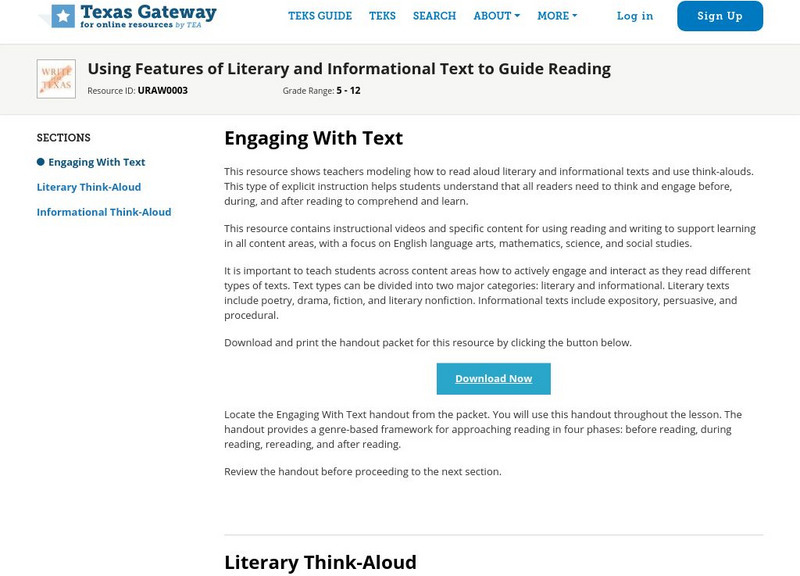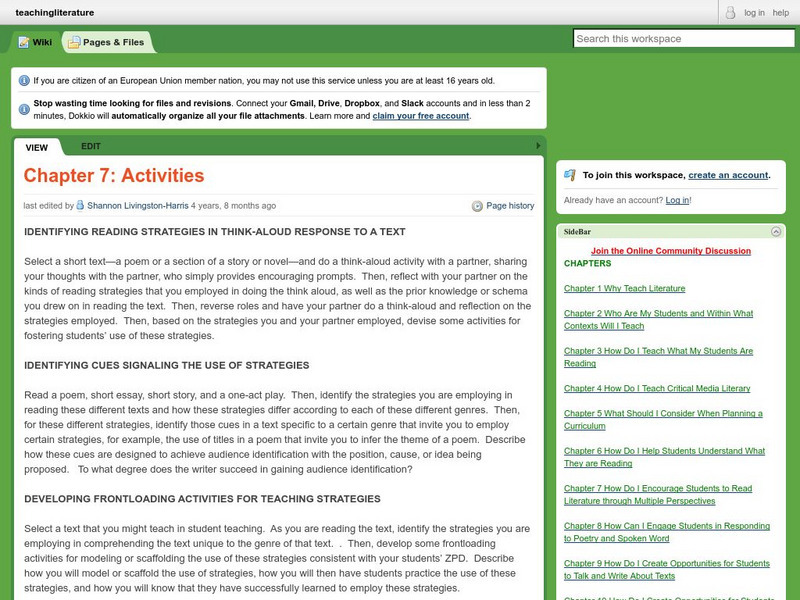Sophia Learning
Sophia: Comparing and Contrasting Texts
This tutorial focuses on writing a comparison and contrast paper for both literary texts and informational texts. It offers a YouTube video about writing a synthesis paper using either a point by point or a source by source arrangement....
Sophia Learning
Sophia: Purpose
This slideshow lesson focuses on purpose; it defines purpose and lists the two main purposes of all writing: to educate (didactic text meaning to inform and instruct) or to entertain (imaginative text). The purpose could also be art for...
Sophia Learning
Sophia: Understanding the Question
This lesson focuses on how to understand a reading question; it details three main parts: look for content and process words, state the question in your own words, and restate the question as a statement. It explains each and provides...
Colorado State University
Colorado State University Writing Center: Informative Speaking
Introduction to basic concepts necessary for delivering an informative speech. Eight different areas are developed from purpose to speech delivery. Look on the right side and select the specific topic you are looking for. SL.9-10.4...
Media Smarts
Media Awareness Network: Lesson Plan: How to Analyze the News [Pdf]
Lesson plan focusing on the importance of understanding how the news is a product with a specific scope, structure, slant and style at the forefront of its production.
Sophia Learning
Sophia: 5 Core Concepts of Media Literacy
In this lesson, students will engage in multiple parts of a lesson that guide students to uncover many levels of meaning in media messages. Discussion questions and a slideshow presentation are parts of the lesson that address the...
Polk Brothers Foundation Center for Urban Education at DePaul University
De Paul University: Center for Urban Education: Compare Central Idea Across Mult Texts [Pdf]
This Center for Urban Education resource provides a downloadable graphic organizer designed for comparing a central idea across multiple texts.
Texas Education Agency
Texas Gateway: Themes in Literary Texts (English 6 Reading)
Learn how to infer the implicit theme in a work of fiction, distinguish theme from topic, and make complex inferences using textual evidence.
Texas Education Agency
Texas Gateway: Synthesize Ideas in Informational/expository Text
[Accessible by TX Educators. Free Registration/Login Required] Learn how to synthesize and make logical connections between ideas within a text and across two or three texts representing similar or different genres and to support the...
CommonLit
Common Lit: What Happened Here
CommonLit.org is a wonderful resource to use in a Language Arts classroom. Each text is accompanied by guided reading questions, assessment questions, and discussion questions. In addition, students can click on words to see the...
CommonLit
Common Lit: Financial Literacy
CommonLit.org is a wonderful resource to use in a Language Arts classroom. Each story or article is accompanied by guided reading questions, assessment questions, and discussion questions. In addition, students can click on words to see...
Department of Defense
Do Dea: English 4; Wealth and Poverty
A learning module asking students to analyze different types of texts, learn literary terms, write a satirical essay and a mock newspaper article, and work with vocabulary skills all within themes related to wealth and poverty.
Department of Defense
Do Dea: English 4; Utopia
A learning module asking students to analyze different types of texts, connect literature to events and experiences, use various writing skills, deconstruct media, practice grammar and vocabulary skills, and analyze point of view,...
Better Lesson
Better Lesson: Audience, Tone, and Style in Informative Text
Students will read samples of informative writing and highlight examples of how tone and style are used by the authors. Students will then apply this knowledge by writing their own informative text. Multiple examples of student work and...
Other
Curriculum Associates: Comparing and Contrasting Texts [Pdf]
In these activities, students are asked to compare and contrast two versions of each event with two pieces of writing that are about the same topic. Teaching notes with answer keys are provided as well.
Department of Defense
Do Dea: English 4; Introduction
A learning module to introduce students to this online learning format and complete a diagnostic writing assignment.
Texas Education Agency
Texas Gateway: Using Features of Literary & Informational Text to Guide Reading
A learning module that teaches students about using text features to guide reading in three mini lessons: Engaging with Text, Literary Think-Aloud, and Informational Think-Aloud. Download a PDF with lesson plans and printable handouts...
E Reading Worksheets
E Reading Worksheets: Patterns of Organization: Compare and Contrast
This learning module provides an explanation of the compare and contrast text structure. An explanation of the compare and contrast text structure is provided, and the compare and contrast text structure is demonstrated in a video...
Rick Beach
Teaching Literature to Adolescents, 2nd Edition: Chapter 7: Activities
The textbook entitled Teaching Literature to Adolescents, 2nd Edition contains activities for Chapter 7 reflection. Intended for teachers, this site contains activities that will extend the content from the Chapter 7. Focus of the...
Curated OER
Mc Graw Hill: Use Details and Examples
Review how to use text evidence, details, examples, and personal experiences to make inferences then read a passage to practice on your own.
Polk Brothers Foundation Center for Urban Education at DePaul University
De Paul University: Center for Urban Education: Read to Learn, Share What You Learn [Pdf]
Several tips for reading to learn are provided on this page. Students will explore the BIG idea presented in a nonfiction piece.
Polk Brothers Foundation Center for Urban Education at DePaul University
Depaul University: Center for Urban Education: I Can Compare and Contrast [Pdf]
This resource is a poster that includes cues that will help students compare and contrast information. These questions can be applied to fiction and nonfiction passages.
Polk Brothers Foundation Center for Urban Education at DePaul University
De Paul University: Center for Urban Education: Expand Story or History Text Based Dialog[pdf]
Students will use graphic organizers to help them make inferences about historical figures' feeings and motives. Students will summarize the information during an extension activity.
InterLink Language Centers
Interlink Language Centers: Reading Exercises Science
An interactive exercise for students to use while developing an understanding of how to read scientific informational texts. The text is presented one paragraph at a time and difficult vocabulary words are defined as footnotes. Then...
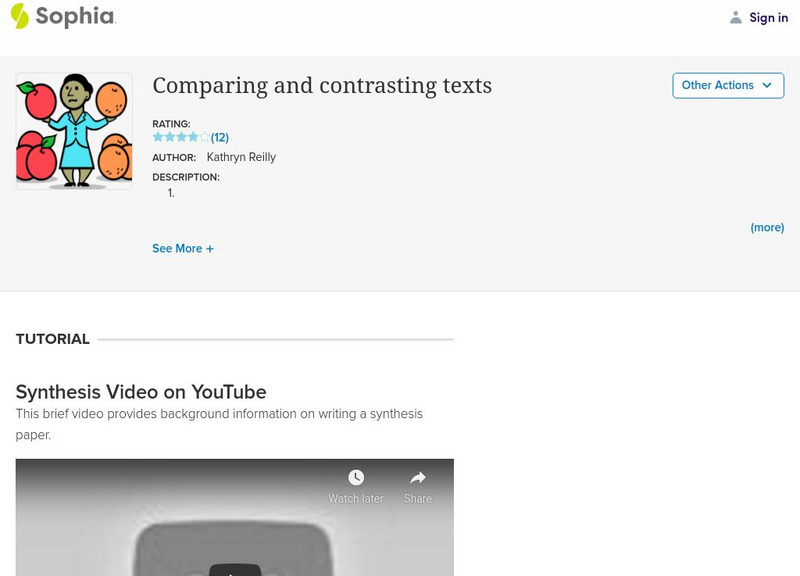
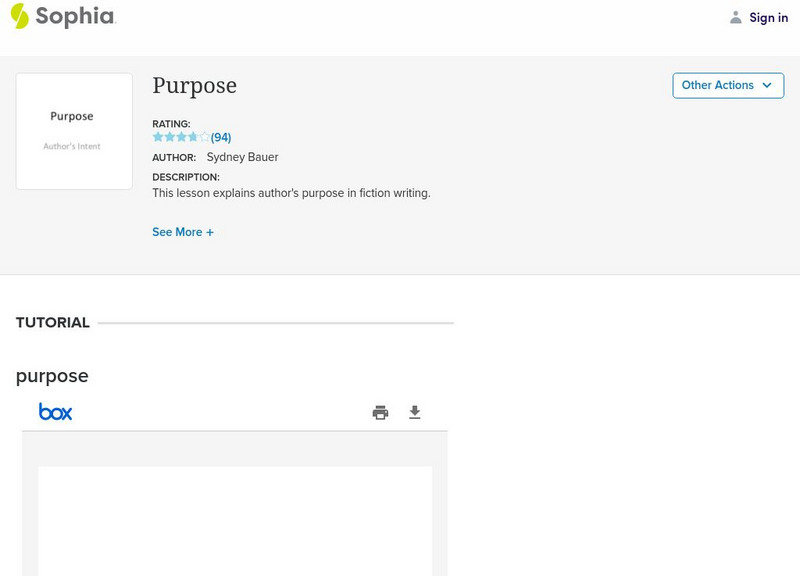
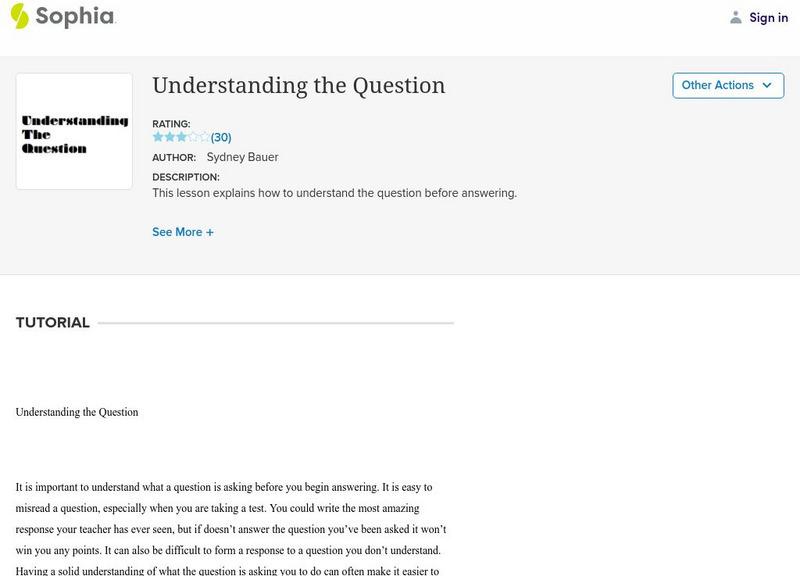

![Media Awareness Network: Lesson Plan: How to Analyze the News [Pdf] Lesson Plan Media Awareness Network: Lesson Plan: How to Analyze the News [Pdf] Lesson Plan](https://static.lp.lexp.cloud/images/attachment_defaults/resource/large/FPO-knovation.png)







